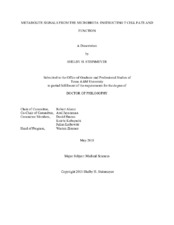| dc.description.abstract | The microbiota has a major impact on host health, and research suggests that the enzymatic
capacity of the microbiota is important to mediate many of its effects on the host. Short-chain
fatty acids (SCFAs) have recently been demonstrated to promote regulatory and effector T cell
differentiation in the GI tract, but germ-free mouse studies suggest that additional signals from
the microbiota are necessary in addition to SCFAs in order to recapitulate T cell lineage
prevalence seen in colonized mice. We recently determined that a number of tryptophan (Trp)
metabolites are present in colonized mice at high concentrations similar to SCFAs but not in
germ-free mice. Therefore, we tested the ability of Trp metabolites to regulate T cell
differentiation and investigated the interaction between Trp metabolites and SCFAs.
We found that the Trp metabolites indole and 5-hydroxyindole have anti- and pro- inflammatory
effects on T cell differentiation, respectively, and some of these effects are dependent on the aryl
hydrocarbon receptor. Additionally, a combination of indole, 5-hydroxyindole, and SCFAs
produced unexpected outcomes during T cell differentiation, specifically promoting tolerogenic
T cell differentiation without inhibition or augmentation of inflammatory T cell differentiation.
The powerful effects we observed in vivo on T cells conditioned with Trp metabolites in vitro
suggests that these metabolites could be a useful conditioning agent for cellular therapeutics. In
addition, the level of Trp metabolites and SCFAs being produced by the microbiota could be a
useful marker for clinical manipulation of the microbiota during pathology such as Inflammatory
Bowel Disease. To support the clinical implications of this work, we verified our major results in
human T cells.
Additionally, we established a protocol for generating a predictive model of microbiota
metabolite interaction during T cell differentiation. We believe this tool will become increasingly
useful as additional active microbiota-derived metabolites are identified and empirical
determination of interaction between all types of active metabolites becomes increasingly
cumbersome. | en |


